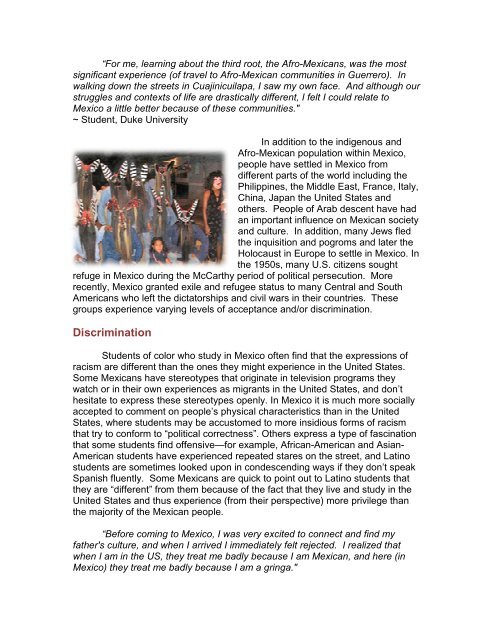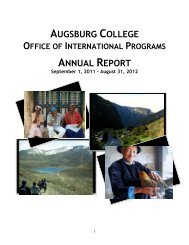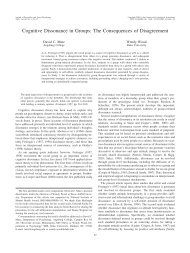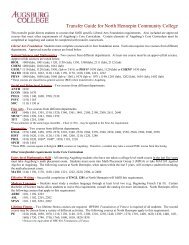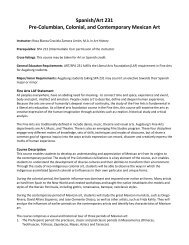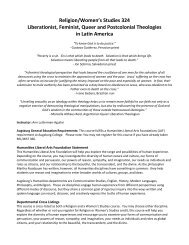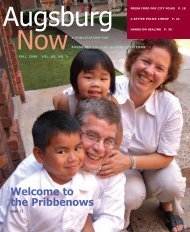Diversity in Mexico sity in Mexico - Augsburg College
Diversity in Mexico sity in Mexico - Augsburg College
Diversity in Mexico sity in Mexico - Augsburg College
You also want an ePaper? Increase the reach of your titles
YUMPU automatically turns print PDFs into web optimized ePapers that Google loves.
“For me, learn<strong>in</strong>g about the third root, the Afro-Mexicans, was the mostsignificant experience (of travel to Afro-Mexican communities <strong>in</strong> Guerrero). Inwalk<strong>in</strong>g down the streets <strong>in</strong> Cuaj<strong>in</strong>icuilapa, I saw my own face. And although ourstruggles and contexts of life are drastically different, I felt I could relate to<strong>Mexico</strong> a little better because of these communities."~ Student, Duke Univer<strong>sity</strong>In addition to the <strong>in</strong>digenous andAfro-Mexican population with<strong>in</strong> <strong>Mexico</strong>,people have settled <strong>in</strong> <strong>Mexico</strong> fromdifferent parts of the world <strong>in</strong>clud<strong>in</strong>g thePhilipp<strong>in</strong>es, the Middle East, France, Italy,Ch<strong>in</strong>a, Japan the United States andothers. People of Arab descent have hadan important <strong>in</strong>fluence on Mexican societyand culture. In addition, many Jews fledthe <strong>in</strong>quisition and pogroms and later theHolocaust <strong>in</strong> Europe to settle <strong>in</strong> <strong>Mexico</strong>. Inthe 1950s, many U.S. citizens soughtrefuge <strong>in</strong> <strong>Mexico</strong> dur<strong>in</strong>g the McCarthy period of political persecution. Morerecently, <strong>Mexico</strong> granted exile and refugee status to many Central and SouthAmericans who left the dictatorships and civil wars <strong>in</strong> their countries. Thesegroups experience vary<strong>in</strong>g levels of acceptance and/or discrim<strong>in</strong>ation.Discrim<strong>in</strong>ationStudents of color who study <strong>in</strong> <strong>Mexico</strong> often f<strong>in</strong>d that the expressions ofracism are different than the ones they might experience <strong>in</strong> the United States.Some Mexicans have stereotypes that orig<strong>in</strong>ate <strong>in</strong> television programs theywatch or <strong>in</strong> their own experiences as migrants <strong>in</strong> the United States, and don’thesitate to express these stereotypes openly. In <strong>Mexico</strong> it is much more sociallyaccepted to comment on people’s physical characteristics than <strong>in</strong> the UnitedStates, where students may be accustomed to more <strong>in</strong>sidious forms of racismthat try to conform to “political correctness”. Others express a type of fasc<strong>in</strong>ationthat some students f<strong>in</strong>d offensive—for example, African-American American and Asian-American students have experienced repeated stares on the street, and Lat<strong>in</strong>ostudents are sometimes looked upon <strong>in</strong> condescend<strong>in</strong>g ways if they don’t speakSpanish fluently. Some Mexicans are quick to po<strong>in</strong>t out to Lat<strong>in</strong>o students thatthey are “different” from them because of the fact that they live and study <strong>in</strong> theUnited States and thus experience (from their perspective) more privilege thanthe majority of the Mexican people.“Before com<strong>in</strong>g to <strong>Mexico</strong>, I was very excited to connect and f<strong>in</strong>d myfather's culture, and when I arrived I immediately felt rejected. I realized thatwhen I am <strong>in</strong> the US, they treat me badly because I am Mexican, and here (<strong>in</strong><strong>Mexico</strong>) they treat me badly because I am a gr<strong>in</strong>ga."


